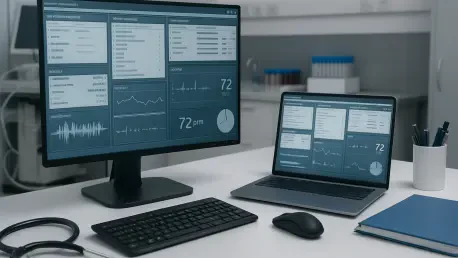In an era where healthcare institutions are grappling with the dual challenges of managing vast amounts of sensitive data and reducing operational costs, a groundbreaking partnership has emerged to address these pressing needs. Rackspace Technology Inc., a San Antonio-based leader in cloud computing, has recently joined forces with the University of Texas at Austin’s Dell Medical School to revolutionize data management through advanced cloud solutions. This collaboration not only marks a significant step toward modernizing healthcare IT but also highlights the potential for cloud technology to eliminate the reliance on traditional physical data centers. By hosting critical systems like the Epic Electronic Health Record platform, Rackspace is paving the way for a more scalable and cost-effective approach. This development sparks curiosity about how such technological shifts could redefine the future of medical data infrastructure and what it means for the broader healthcare industry.
Pioneering Cloud Solutions in Healthcare
A Landmark Partnership with Dell Medical School
The alliance between Rackspace Technology Inc. and Dell Medical School represents a pioneering move in healthcare IT, as it positions the medical school as the first of its kind to fully transition to Rackspace’s cloud infrastructure. This strategic partnership enables Dell Med to host vital systems, including the Epic Electronic Health Record platform, which will support future clinics and hospitals. By moving away from the conventional on-site data center model, the school stands to save significantly on the costs associated with building and maintaining physical infrastructure. Instead, data is securely stored and managed on Rackspace’s remote hardware, a shift that promises enhanced flexibility but also underscores the critical need for reliable internet connectivity. Michael Ryan, Dell Med’s chief information officer, has emphasized how this collaboration aligns with the institution’s mission to innovate, with the Epic deployment serving as a cornerstone for future growth.
Driving Efficiency through Cloud Modernization
Beyond the immediate benefits for Dell Medical School, this partnership reflects a broader trend of healthcare institutions embracing cloud technology to modernize data management. Rackspace is tapping into a surging demand for efficient solutions to handle the enormous volumes of sensitive information generated in the medical field. Market projections from Gartner highlight the explosive growth of cloud-based electronic health record hosting, with the sector expected to expand from current figures to nearly $197 billion by 2032. This trajectory underscores the transformative potential of scalable cloud solutions in reducing operational burdens while maintaining high standards of data security. Harjott Atrii, a senior executive at Rackspace, has noted the company’s specialized expertise in delivering secure, tailored capabilities that meet the unique needs of healthcare providers, positioning Rackspace as a key player in this evolving landscape.
Challenges and Opportunities in Cloud Adoption
Balancing Innovation with Financial Struggles
While the collaboration with Dell Medical School showcases Rackspace’s innovative approach, it arrives amid notable financial challenges for the company. Recent reports reveal a significant quarterly loss of $54.5 million, marking a continuation of declining revenues in both private and public cloud segments. Specifically, private cloud revenue decreased by 4% to $249.7 million, while public cloud revenue saw a 2% drop to $416.6 million compared to the prior year. Analyst downgrades, including shifts in ratings by Wall Street Zen and Raymond James, reflect growing concerns about Rackspace’s financial health. Despite these setbacks, the company remains committed to adapting to emerging technologies like artificial intelligence, which are reshaping customer expectations and demands. This duality of pursuing cutting-edge partnerships while navigating operational difficulties illustrates the complex environment in which Rackspace operates.
Securing Data with Private Cloud Advantages
A critical aspect of Rackspace’s appeal in the healthcare sector lies in its private cloud offerings, which provide dedicated hardware for heightened security and customization compared to shared public cloud models. For Dell Medical School, this means ensuring data integrity and compliance with stringent regulatory requirements, a non-negotiable priority in handling sensitive patient information. Unlike public cloud setups where multiple accounts share infrastructure, potentially increasing security risks, the private cloud model offers a tailored environment that aligns with the specific needs of academic medical centers. This approach allows Dell Med to focus on its goal of innovation without the burden of maintaining physical servers. The partnership highlights how Rackspace’s specialized services can address the unique challenges of healthcare IT, setting a precedent for other institutions considering a shift to cloud-based solutions in the face of evolving industry standards.
Reflecting on a Strategic Shift
Looking back, the partnership between Rackspace Technology Inc. and Dell Medical School stood as a defining moment in the journey toward cloud-driven healthcare IT. It demonstrated how strategic collaborations could alleviate the financial and logistical burdens of traditional data centers while prioritizing data security through private cloud infrastructure. For other healthcare organizations observing this milestone, the path forward involved evaluating similar cloud transitions to achieve scalability and cost savings. Exploring partnerships with trusted technology providers became a practical next step, as did investing in robust connectivity to support remote data hosting. This pivotal alliance not only showcased Rackspace’s potential to lead in specialized sectors despite financial hurdles but also encouraged a broader industry conversation about balancing innovation with operational stability in an increasingly digital landscape.









